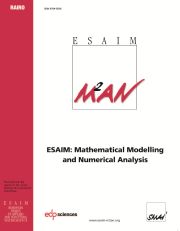Crossref Citations
This article has been cited by the following publications. This list is generated based on data provided by
Crossref.
Hiptmair, Ralf
and
Perugia, Ilaria
2009.
Domain Decomposition Methods in Science and Engineering XVIII.
Vol. 70,
Issue. ,
p.
51.
Gittelson, Claude J.
Hiptmair, Ralf
and
Perugia, Ilaria
2009.
Plane wave discontinuous Galerkin methods: Analysis of theh-version.
ESAIM: Mathematical Modelling and Numerical Analysis,
Vol. 43,
Issue. 2,
p.
297.
Melenk, J.
and
Sauter, S.
2010.
Convergence analysis for finite element discretizations of the Helmholtz equation with Dirichlet-to-Neumann boundary conditions.
Mathematics of Computation,
Vol. 79,
Issue. 272,
p.
1871.
Hiptmair, R.
Moiola, A.
and
Perugia, I.
2011.
Plane Wave Discontinuous Galerkin Methods for the 2D Helmholtz Equation: Analysis of the p-Version.
SIAM Journal on Numerical Analysis,
Vol. 49,
Issue. 1,
p.
264.
Moiola, A.
Hiptmair, R.
and
Perugia, I.
2011.
Plane wave approximation of homogeneous Helmholtz solutions.
Zeitschrift für angewandte Mathematik und Physik,
Vol. 62,
Issue. 5,
p.
809.
Melenk, J. M.
and
Sauter, S.
2011.
Wavenumber Explicit Convergence Analysis for Galerkin Discretizations of the Helmholtz Equation.
SIAM Journal on Numerical Analysis,
Vol. 49,
Issue. 3,
p.
1210.
Esterhazy, S.
and
Melenk, J. M.
2012.
Numerical Analysis of Multiscale Problems.
Vol. 83,
Issue. ,
p.
285.
Luostari, Teemu
Huttunen, Tomi
and
Monk, Peter
2012.
The Ultra Weak Variational Formulation Using Bessel Basis Functions.
Communications in Computational Physics,
Vol. 11,
Issue. 2,
p.
400.
Melenk, J. M.
Parsania, A.
and
Sauter, S.
2013.
General DG-Methods for Highly Indefinite Helmholtz Problems.
Journal of Scientific Computing,
Vol. 57,
Issue. 3,
p.
536.
Luostari, Teemu
Huttunen, Tomi
and
Monk, Peter
2013.
Error estimates for the ultra weak variational formulation in linear elasticity.
ESAIM: Mathematical Modelling and Numerical Analysis,
Vol. 47,
Issue. 1,
p.
183.
Luostari, T.
Huttunen, T.
and
Monk, P.
2013.
Improvements for the ultra weak variational formulation.
International Journal for Numerical Methods in Engineering,
Vol. 94,
Issue. 6,
p.
598.
Wu, Xinming
and
Chen, Wenbin
2013.
Error Estimates of the Finite Element Method for Interior Transmission Problems.
Journal of Scientific Computing,
Vol. 57,
Issue. 2,
p.
331.
Moiola, Andrea
and
Spence, Euan A.
2014.
Is the Helmholtz Equation Really Sign-Indefinite?.
SIAM Review,
Vol. 56,
Issue. 2,
p.
274.
Hiptmair, Ralf
Moiola, Andrea
and
Perugia, Ilaria
2014.
Trefftz discontinuous Galerkin methods for acoustic scattering on locally refined meshes.
Applied Numerical Mathematics,
Vol. 79,
Issue. ,
p.
79.
Howarth, C.J.
Childs, P.N.
and
Moiola, A.
2014.
Implementation of an interior point source in the ultra weak variational formulation through source extraction.
Journal of Computational and Applied Mathematics,
Vol. 271,
Issue. ,
p.
295.
Sauter, S.
and
Zech, J.
2015.
A Posteriori Error Estimation of $hp$-$dG$ Finite Element Methods for Highly Indefinite Helmholtz Problems.
SIAM Journal on Numerical Analysis,
Vol. 53,
Issue. 5,
p.
2414.
Imbert-Gérard, Lise-Marie
2015.
Well-posedness and generalized plane waves simulations of a 2D mode conversion model.
Journal of Computational Physics,
Vol. 303,
Issue. ,
p.
105.
Imbert-Gérard, Lise-Marie
2015.
Interpolation properties of generalized plane waves.
Numerische Mathematik,
Vol. 131,
Issue. 4,
p.
683.
Antonietti, Paola F.
Perugia, Ilaria
and
Davide, Zaliani
2015.
Numerical Mathematics and Advanced Applications - ENUMATH 2013.
Vol. 103,
Issue. ,
p.
557.
Kapita, Shelvean
Monk, Peter
and
Warburton, Timothy
2015.
Residual-Based Adaptivity and PWDG Methods for the Helmholtz Equation.
SIAM Journal on Scientific Computing,
Vol. 37,
Issue. 3,
p.
A1525.


